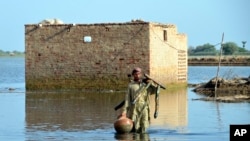Pakistan's foreign minister said Monday that recent deadly floods are a disaster on a scale the country has never experienced, and that recovery will cost at least $30 billion.
"It is said that in the story of Noah that it rained for 40 days and 40 nights, and I mean that's the sort of scale we are looking at here," Foreign Minister Bilawal Bhutto Zardari said, referencing the biblical story of the man who built an ark when flood waters came.
The monsoon rains started in mid-June and continued through August. The powerful floods they triggered displaced millions of people and swept away homes and livelihoods. A third of the country has been submerged; more than 1,500 people perished.
The World Health Organization warned of a second disaster if there are outbreaks of waterborne diseases such as malaria, typhoid and cholera.
The U.S. Agency for International Development (USAID) announced it will send $50 million in assistance for emergency relief.
The foreign minister told VOA in an interview on the sidelines of the U.N. General Assembly that recovery and reconstruction will be "colossal" and cost far more — about $30 billion.
Bhutto Zardari said he was not "a huge climate activist" before the floods, but having seen it firsthand, believes global warming is an "extremely existential crisis."
"The issue of climate change, and many other challenges that we face, can't be handled by any one country alone," he added. "So we look forward to working with our international partners on these pressing issues."
That, he said, includes finding ways to mitigate the effects of the climate crisis on countries like his own that emit relatively small amounts of greenhouse gases but suffer the largest impacts.
The floods come as the country is already in the midst of a financial crisis and is feeling the impact of lost Ukrainian grain imports due to Russia's war.
Pakistan has tried to take a neutral stance on the conflict, abstaining in a vote in the U.N. General Assembly on March 2 that overwhelmingly saw nations condemn Moscow's invasion of its neighbor.
"I think we are adamant that we don't want to get drawn into any such conflict at this time," Bhutto Zardari said.
His message to the international community is that dialogue and diplomacy are needed.
"We've just come out of an incredibly long conflict in the region after what happened in Afghanistan," he said. "And we just don't think this should be the age of new conflicts."
As for neighboring Afghanistan, which the Taliban took over 13 months ago, while Islamabad engages with the de facto authorities, they have not recognized them as the official government.
"I think Pakistan, along with a lot of the international community, are looking for the interim Afghanistan government to take the appropriate steps to live up to the international obligations necessary so that this recognition process can go forward," he said, adding that it is in the interests of the region and the world if Afghanistan achieves peace and stability.
On July 31, a U.S. drone strike killed the leader of al-Qaida, Ayman Zawahri, in a house in the center of the Afghan capital. The Taliban accused Pakistan of allowing the drones to use their airspace. Bhutto Zardari said "there's absolutely no evidence" of this.
As for Pakistan's other neighbor, India, he said he has no plans to meet with his counterpart in New York this week, as relations are still sour over India's revocation of the special status of Jammu and Kashmir in August 2019.




